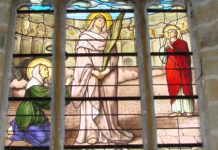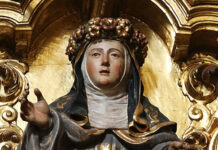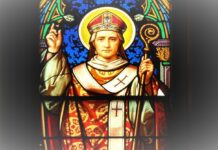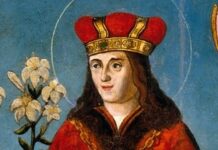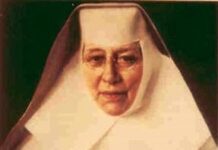Saturday of the 16th Week in Ordinary Time
Featured Saints

St. Charbel Makhluf, priest (+1898). Optional Memorial. A Lebanese Maronite monk known for his asceticism and profound mystical life. He was later permitted to live as a solitary hermit and acquired a widespread reputation for holiness during his life.
Sts. Boris and Gleb, martyrs (†1015). Sons of St. Vladimir, Grand Prince of Kiev, they preferred to die than to enter into armed conflict with their brother Sviatopolk.
Blessed Louise of Savoy, religious (†1503). Daughter of Blessed Amadeus, Duke of Savoy. She married Hugo, Prince of Chalon, and was widowed while still very young. She abandoned worldly honours and riches to become a Clarist under the reform of St. Colette.
Blessed Maria Mercedes Prat, virgin and martyr (†1936). Shot for being a nun during the anti-Catholic hatred of the Spanish Civil War.
St. Joseph Fernandez, priest and martyr (†1838). Dominican missionary beheaded during the reign of Emperor Minh Mang, in Nam Dinh (Vietnam).
St. Euphrasia, virgin (†fifth century). From a noble senatorial family, she withdrew to lead a hermitic life in the desert in Egypt.
St. Baldwin, abbot (†1140). Disciple of St. Bernard in the monastery of Clairvaux, he founded the Monastery of St. Matthew in Rieti, Italy.
St. Fantinus the Elder (†fourth century). Nicknamed the Wonderworker, he performed many prodigies in Tauriana, Italy.
St. Kinga (or Cunegunde) of Poland, religious (†1293). Daughter of the King of Hungary, she married the Prince of Krakow, Bolesław V , and both lived in perfect chastity. After the death of her spouse, she became a Poor Clare in the monastery she had founded.
Mass Readings
First Reading – Ex 24:3-8
When Moses came to the people
and related all the words and ordinances of the LORD,
they all answered with one voice,
“We will do everything that the LORD has told us.”
Moses then wrote down all the words of the LORD and,
rising early the next day,
he erected at the foot of the mountain an altar
and twelve pillars for the twelve tribes of Israel.
Then, having sent certain young men of the children of Israel
to offer burnt offerings and sacrifice young bulls
as peace offerings to the LORD,
Moses took half of the blood and put it in large bowls;
the other half he splashed on the altar.
Taking the book of the covenant, he read it aloud to the people,
who answered, “All that the LORD has said, we will heed and do.”
Then he took the blood and sprinkled it on the people, saying,
“This is the blood of the covenant
that the LORD has made with you
in accordance with all these words of his.”
Responsorial Psalm – Ps 50:1b-2, 5-6, 14-15 (R.14a)
R. Offer to God a sacrifice of praise.
God the LORD has spoken and summoned the earth,
from the rising of the sun to its setting.
From Zion, perfect in beauty,
God shines forth. R.
“Gather my faithful ones before me,
those who have made a covenant with me by sacrifice.”
And the heavens proclaim his justice;
for God himself is the judge. R.
“Offer to God praise as your sacrifice
and fulfill your vows to the Most High;
Then call upon me in time of distress;
I will rescue you, and you shall glorify me.” R.
Gospel – Mt 13:24-30
Jesus proposed a parable to the crowds.
“The Kingdom of heaven may be likened to a man
who sowed good seed in his field.
While everyone was asleep his enemy came
and sowed weeds all through the wheat, and then went off.
When the crop grew and bore fruit, the weeds appeared as well.
The slaves of the householder came to him and said,
‘Master, did you not sow good seed in your field?
Where have the weeds come from?’
He answered, ‘An enemy has done this.’
His slaves said to him, ‘Do you want us to go and pull them up?’
He replied, ‘No, if you pull up the weeds
you might uproot the wheat along with them.
Let them grow together until harvest;
then at harvest time I will say to the harvesters,
“First collect the weeds and tie them in bundles for burning;
but gather the wheat into my barn.”’”


